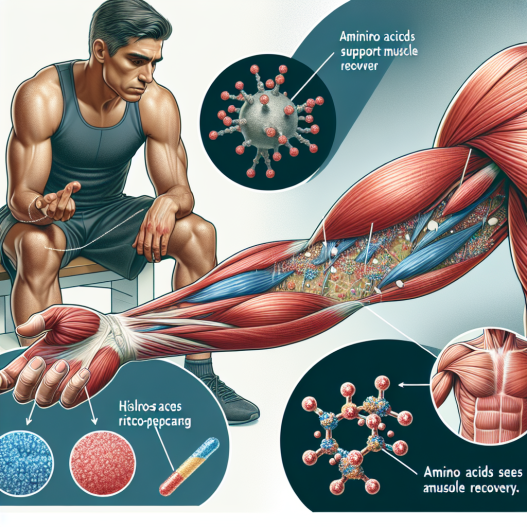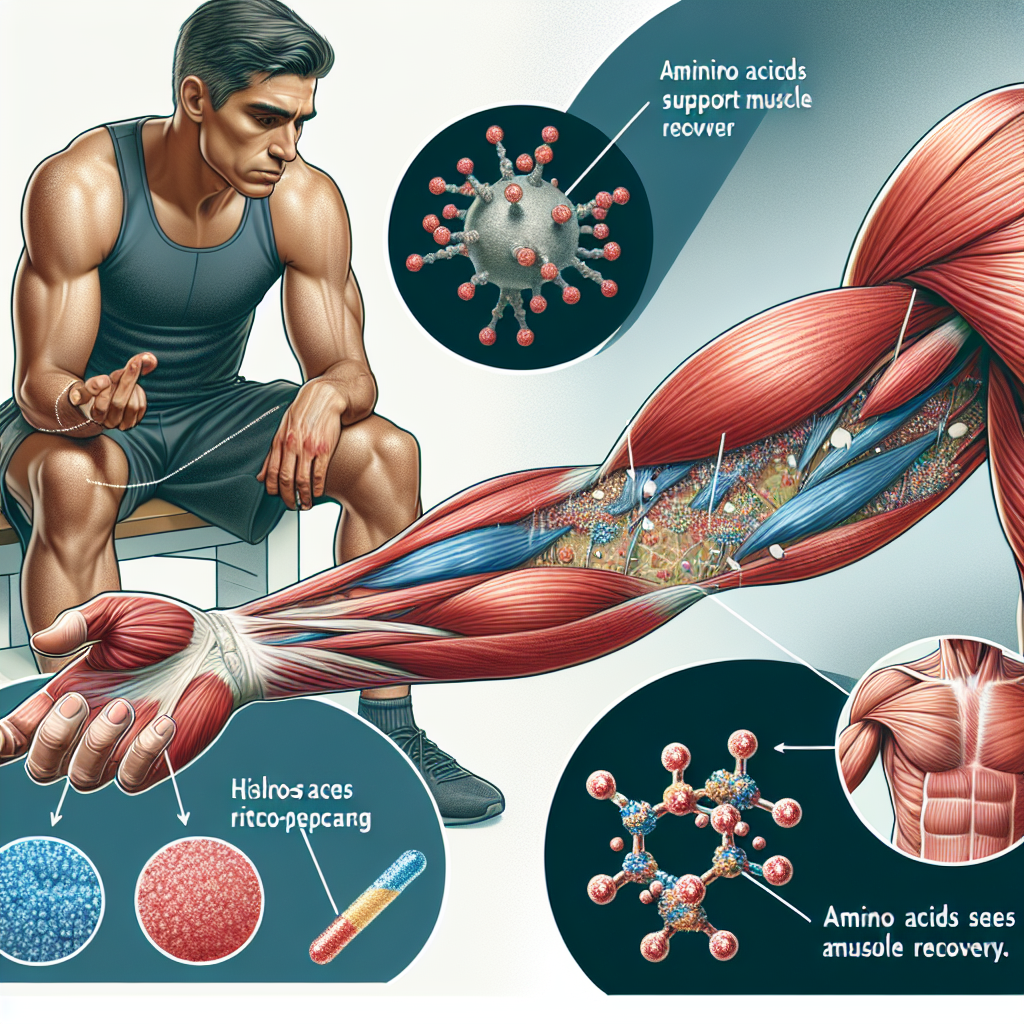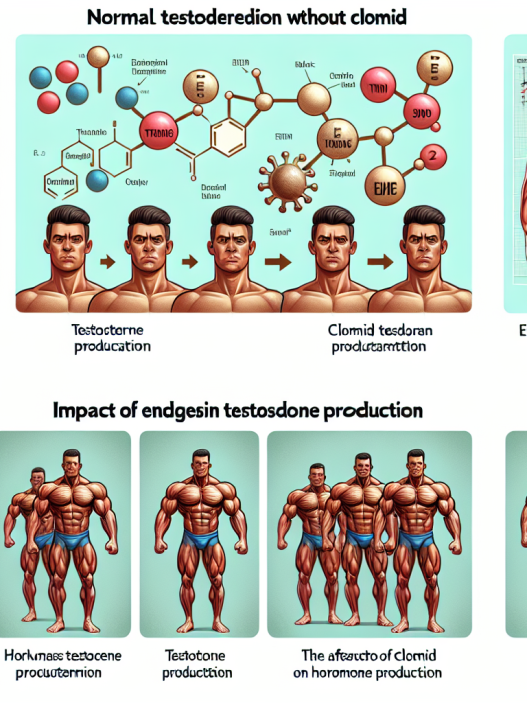-
Table of Contents
Amino Acids: Supporting Muscle Recovery Post-Workout
As athletes and fitness enthusiasts, we all know the feeling of pushing our bodies to the limit during a workout. Whether it’s lifting weights, running, or participating in a high-intensity sport, our muscles are put through a lot of stress and strain. While this is necessary for building strength and endurance, it can also lead to muscle damage and soreness. This is where amino acids come in – these essential building blocks of protein play a crucial role in supporting muscle recovery post-workout.
The Role of Amino Acids in Muscle Recovery
Amino acids are the building blocks of protein, which is essential for muscle growth and repair. During a workout, our muscles experience micro-tears, which is a normal part of the muscle-building process. However, these tears can lead to muscle soreness and fatigue. Amino acids help to repair these tears and promote muscle recovery by providing the necessary nutrients for muscle repair and growth.
There are 20 different amino acids that make up the proteins in our bodies, and each one plays a specific role in muscle recovery. However, there are three key amino acids that are particularly important for post-workout recovery: leucine, isoleucine, and valine. These three amino acids are known as branched-chain amino acids (BCAAs) and make up about one-third of the protein in our muscles.
Leucine
Leucine is considered the most important amino acid for muscle recovery. It plays a crucial role in stimulating muscle protein synthesis, which is the process of building new muscle tissue. Leucine also helps to reduce muscle breakdown, which is essential for maintaining muscle mass. Studies have shown that supplementing with leucine can improve muscle recovery and reduce muscle soreness after a workout (Norton & Layman, 2006).
Isoleucine and Valine
Isoleucine and valine work together with leucine to support muscle recovery. These two amino acids also help to stimulate muscle protein synthesis and reduce muscle breakdown. Additionally, isoleucine and valine can help to increase energy levels during a workout, allowing you to push harder and recover faster (Blomstrand et al., 2006).
The Importance of Timing and Dosage
While amino acids are essential for muscle recovery, the timing and dosage of supplementation are crucial. Studies have shown that consuming BCAAs before and after a workout can help to reduce muscle soreness and promote muscle recovery (Shimomura et al., 2006). It is recommended to consume BCAAs within 30 minutes of completing a workout to maximize their benefits.
The recommended dosage of BCAAs for muscle recovery is 5-10 grams before and after a workout. However, this may vary depending on individual factors such as body weight and exercise intensity. It is always best to consult with a healthcare professional or sports nutritionist to determine the appropriate dosage for your specific needs.
Real-World Examples
Many athletes and fitness enthusiasts have experienced the benefits of amino acid supplementation for muscle recovery. One example is professional bodybuilder and fitness model, Steve Cook. In an interview, Cook shared that he takes BCAAs before and after his workouts to support muscle recovery and reduce muscle soreness (Cook, 2018).
Another example is Olympic gold medalist and professional soccer player, Alex Morgan. In an interview, Morgan revealed that she takes BCAAs during her training sessions to help her muscles recover and maintain her energy levels (Morgan, 2019).
Expert Opinion
According to Dr. John Berardi, co-founder of Precision Nutrition and a leading expert in sports nutrition, “Amino acids are essential for muscle recovery and growth. Consuming BCAAs before and after a workout can help to reduce muscle soreness and promote muscle repair, allowing athletes to train harder and recover faster.” (Berardi, 2019).
Conclusion
Amino acids play a crucial role in supporting muscle recovery post-workout. The three key amino acids, leucine, isoleucine, and valine, are particularly important for stimulating muscle protein synthesis and reducing muscle breakdown. Timing and dosage are also essential for maximizing the benefits of amino acid supplementation. With the right approach, athletes and fitness enthusiasts can use amino acids to support their muscle recovery and reach their fitness goals.
References
Berardi, J. (2019). The importance of amino acids for muscle recovery. Precision Nutrition. Retrieved from https://www.precisionnutrition.com/amino-acids-muscle-recovery
Blomstrand, E., Eliasson, J., Karlsson, H. K., & Köhnke, R. (2006). Branched-chain amino acids activate key enzymes in protein synthesis after physical exercise. The Journal of Nutrition, 136(1), 269S-273S.
Cook, S. (2018). Steve Cook’s supplement stack. Bodybuilding.com. Retrieved from https://www.bodybuilding.com/content/steve-cooks-supplement-stack.html
Morgan, A. (2019). Alex Morgan’s supplement stack. Bodybuilding.com. Retrieved from https://www.bodybuilding.com/content/alex-morgans-supplement-stack.html
Norton, L. E., & Layman, D. K. (2006). Leucine regulates translation initiation of protein synthesis in skeletal muscle after exercise. The Journal of Nutrition, 136(2), 533S-537S.
Shimomura, Y., Inaguma, A., Watanabe, S., Yamamoto, Y., Muramatsu, Y., Bajotto, G., … & Mawatari, K. (2006). Branched-chain amino acid supplementation before squat exercise and delayed-onset muscle soreness. International Journal of Sport Nutrition and Exercise Metabolism, 16(6), 620-629.

















